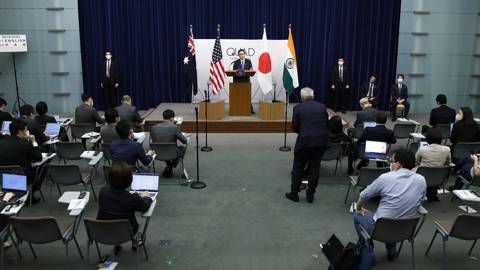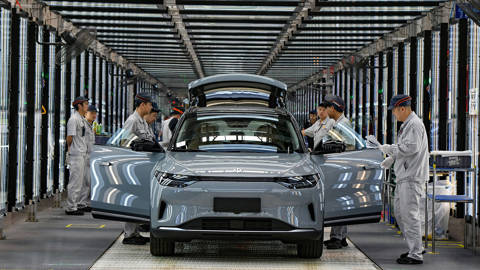I visited Ghana recently and like many others left asking: how can a "developing" country be developed? But there was something troubling about this formulation, in particular with the word "developing," which is often a euphemism for the
absence
of economic development. Do countries stop developing because outsiders are so intent on developing them?
My hosts, the Kweku Hutchful Foundation, invited me with a different question in mind: How can Ghanaian leaders be developed? Something troubled me about this formulation, too. It was that word "development" again.
Do we really "develop" leaders or countries? Do multinational companies, international non-governmental organizations, and multilateral lenders really understand local needs? Just because some "best practice" works in New York, does that mean it will work in Accra, Ghana? Imagine how American managers would react to consultants arriving from Ghana with their "best practice": "It worked in Accra, so it is bound to work in New York!"
Of course, there is a prominent example of just that: Kofi Annan, under whose stewardship the UN has undergone a remarkable improvement. Annan spent most of his career outside of Ghana, and had some of his higher education in the US. But, as one of Annan's advisors once put it, he "runs the UN like an old-fashioned African village, with long discussions among the elders, periods of reflection, and eventually a decision."
Of course, Annan can hardly control the UN by imposing great strategies on everyone else, as American corporate CEOs do. But perhaps he knows better.
Unlike most American CEOs, Annan was not parachuted in from outside; he is the first career employee to lead the UN. So he knew what was wrong and appreciated that it had to be fixed carefully and patiently, by engaging the staff rather than intimidating them. His re-election to a second term as UN Secretary General was supported by nations all over the world, rich and poor, as well as by UN employees.
Was Kofi Annan "developed?" Perhaps we don't develop leaders so much as foster the conditions that bring out leadership. If so, then a key condition must be the self-respect that comes from working things out for ourselves, individually and collectively. This self-respect is fostered by organizations and institutions that can likewise stand on their own feet, building on the best of their own cultural traditions.
Passive importation of techniques, controls, and beliefs, via agencies and experts that run around solving everyone else's problems, may be the biggest impediment to development--just another form of outside exploitation, of which Africa has had more than enough. Is it not time for indigenous development, of countries and leaders alike?
One thing is clear. Countries like Ghana do not lack enterprise. Markets and personal initiative are pervasive. At a red light in New York, a squeegee kid or two might approach your car; in Accra, a stopped car is immediately surrounded by a virtual supermarket.
What Ghana and most of Africa lacks is not enterprise, but
enterprises
. Micro-financing--small loans to self-employed craftspeople and the like--can help. But development at this level may not be the problem. The problem is the lack of indigenous enterprises incorporated beyond the efforts of individuals and small families.
Instead, foreign corporations, with their funds, controls, and experts--and, just as importantly, their beliefs--dominate larger enterprise. To be sure, foreign corporations can do good things: bring in fresh ideas, techniques, and processes, as well as capital and the scale required in some contemporary forms of manufacturing. But nothing they do--aside from cosmetic modifications to consumer products and marketing tactics--responds to local conditions.
Development as now practiced often fails because it does not build on a country's unique strengths, respect its social traditions, or foster the autonomy necessary to develop indigenous leaders and enterprises. All too often, it is
forced
development, imposed against people's natural inclinations and will.
Pride, dignity, and self-confidence do not figure in economic theory: they cannot be measured. But they figure prominently in just about every story of success, whether of countries or of leaders. How people feel about themselves, personally and collectively, greatly influences the energy with which they develop themselves.
America, for example, did not develop by depending on an imposed ideology or outside experts. It developed through the indigenous efforts of Americans acting in their own way--assisted by extensive state intervention, through land grants to farmers, railroads, and mining companies, military spending that stimulated the economy (and still does), and, of course, tariff barriers. Likewise, indigenous development played a key role in Japan and Germany after WWII, in South Korea more recently, and the UK long before.
In fact, has
any
country ever developed primarily through the wholesale importation of capital, expertise, and beliefs--the equivalent of globalization today? For the answer to how to develop an economy, we need look no further than those economies that have developed: begin with a great deal of indigenous initiative, support it with concerted state intervention, and reinforce it with the appropriate importation of external help.
Globalization must not be allowed to blind us. Ghana certainly needs to develop economically, because material wealth is required to improve health, provide education, and sustain democracy. But the reverse is also true: a deep-rooted sense of democracy--precisely what globalization lacks--seems necessary to support economic efforts. The (economically) developed West should consider importing that lesson.










I visited Ghana recently and like many others left asking: how can a "developing" country be developed? But there was something troubling about this formulation, in particular with the word "developing," which is often a euphemism for the absence of economic development. Do countries stop developing because outsiders are so intent on developing them?
My hosts, the Kweku Hutchful Foundation, invited me with a different question in mind: How can Ghanaian leaders be developed? Something troubled me about this formulation, too. It was that word "development" again.
Do we really "develop" leaders or countries? Do multinational companies, international non-governmental organizations, and multilateral lenders really understand local needs? Just because some "best practice" works in New York, does that mean it will work in Accra, Ghana? Imagine how American managers would react to consultants arriving from Ghana with their "best practice": "It worked in Accra, so it is bound to work in New York!"
Of course, there is a prominent example of just that: Kofi Annan, under whose stewardship the UN has undergone a remarkable improvement. Annan spent most of his career outside of Ghana, and had some of his higher education in the US. But, as one of Annan's advisors once put it, he "runs the UN like an old-fashioned African village, with long discussions among the elders, periods of reflection, and eventually a decision."
Of course, Annan can hardly control the UN by imposing great strategies on everyone else, as American corporate CEOs do. But perhaps he knows better.
Unlike most American CEOs, Annan was not parachuted in from outside; he is the first career employee to lead the UN. So he knew what was wrong and appreciated that it had to be fixed carefully and patiently, by engaging the staff rather than intimidating them. His re-election to a second term as UN Secretary General was supported by nations all over the world, rich and poor, as well as by UN employees.
SPRING SALE: Save 40% on all new Digital or Digital Plus subscriptions
Subscribe now to gain greater access to Project Syndicate – including every commentary and our entire On Point suite of subscriber-exclusive content – starting at just $49.99.
Subscribe Now
Was Kofi Annan "developed?" Perhaps we don't develop leaders so much as foster the conditions that bring out leadership. If so, then a key condition must be the self-respect that comes from working things out for ourselves, individually and collectively. This self-respect is fostered by organizations and institutions that can likewise stand on their own feet, building on the best of their own cultural traditions.
Passive importation of techniques, controls, and beliefs, via agencies and experts that run around solving everyone else's problems, may be the biggest impediment to development--just another form of outside exploitation, of which Africa has had more than enough. Is it not time for indigenous development, of countries and leaders alike?
One thing is clear. Countries like Ghana do not lack enterprise. Markets and personal initiative are pervasive. At a red light in New York, a squeegee kid or two might approach your car; in Accra, a stopped car is immediately surrounded by a virtual supermarket.
What Ghana and most of Africa lacks is not enterprise, but enterprises . Micro-financing--small loans to self-employed craftspeople and the like--can help. But development at this level may not be the problem. The problem is the lack of indigenous enterprises incorporated beyond the efforts of individuals and small families.
Instead, foreign corporations, with their funds, controls, and experts--and, just as importantly, their beliefs--dominate larger enterprise. To be sure, foreign corporations can do good things: bring in fresh ideas, techniques, and processes, as well as capital and the scale required in some contemporary forms of manufacturing. But nothing they do--aside from cosmetic modifications to consumer products and marketing tactics--responds to local conditions.
Development as now practiced often fails because it does not build on a country's unique strengths, respect its social traditions, or foster the autonomy necessary to develop indigenous leaders and enterprises. All too often, it is forced development, imposed against people's natural inclinations and will.
Pride, dignity, and self-confidence do not figure in economic theory: they cannot be measured. But they figure prominently in just about every story of success, whether of countries or of leaders. How people feel about themselves, personally and collectively, greatly influences the energy with which they develop themselves.
America, for example, did not develop by depending on an imposed ideology or outside experts. It developed through the indigenous efforts of Americans acting in their own way--assisted by extensive state intervention, through land grants to farmers, railroads, and mining companies, military spending that stimulated the economy (and still does), and, of course, tariff barriers. Likewise, indigenous development played a key role in Japan and Germany after WWII, in South Korea more recently, and the UK long before.
In fact, has any country ever developed primarily through the wholesale importation of capital, expertise, and beliefs--the equivalent of globalization today? For the answer to how to develop an economy, we need look no further than those economies that have developed: begin with a great deal of indigenous initiative, support it with concerted state intervention, and reinforce it with the appropriate importation of external help.
Globalization must not be allowed to blind us. Ghana certainly needs to develop economically, because material wealth is required to improve health, provide education, and sustain democracy. But the reverse is also true: a deep-rooted sense of democracy--precisely what globalization lacks--seems necessary to support economic efforts. The (economically) developed West should consider importing that lesson.